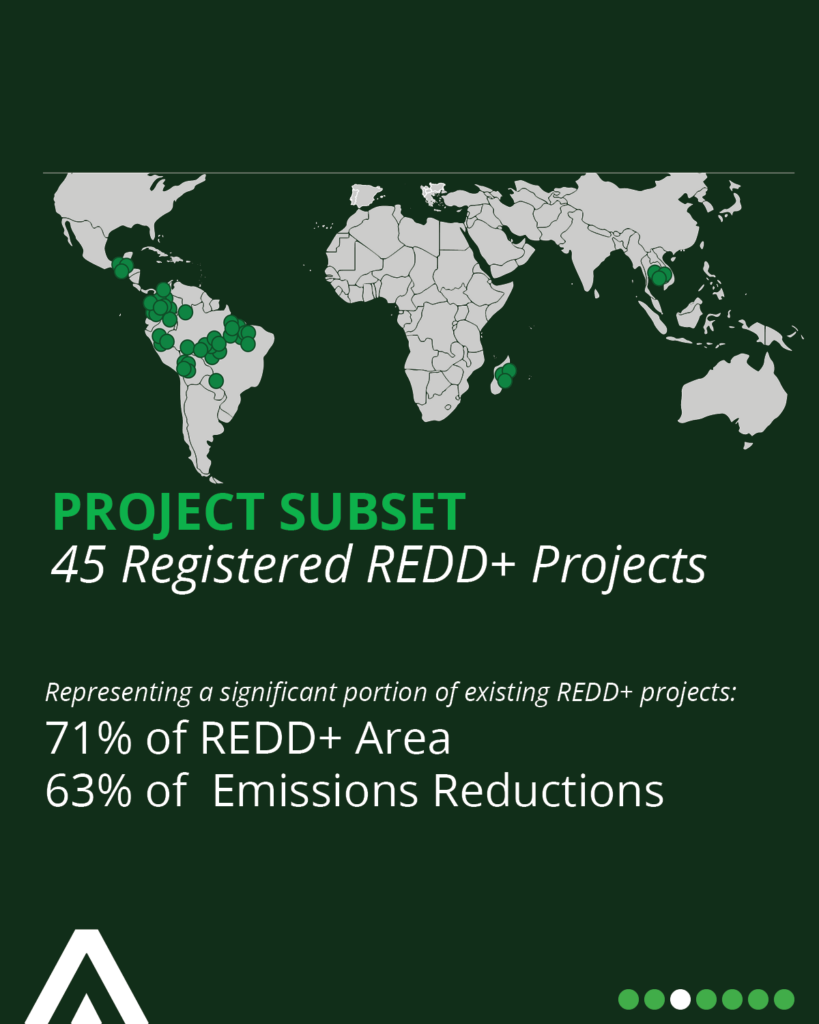
10 December 2024 – A white paper published today by researchers from Everland and Space Intelligence concludes that carbon crediting from REDD+ projects has been robust when assessed system-wide across its twenty-year history. The study compared the baseline forest loss projections of 45 REDD+ projects (developed before the projects began) to the actual forest loss that took place in the jurisdictions surrounding the projects after the projects began, over a twenty-year period (2002-2022). Together, the projects encompass 71% of the total area and 63% of the projected emissions reductions from all avoided unplanned deforestation (AUD) projects currently registered under Verra’s Verified Carbon Standard (VCS) program. Below, Everland’s CEO Joshua Tosteson reflects on the findings and their implications for the future of REDD+.
This study is part of an ongoing research program exploring the effectiveness of the project-based, voluntary REDD+ (Reducing Emissions from Deforestation and Forest Degradation) mechanism.
REDD+ has functioned effectively as an incentive mechanism that values standing forests economically and catalyzes behavior change on the ground, achieving low rates of forest loss whilst safeguarding and improving the livelihoods of forest communities (Guizar-Coutiño et al., 2022; Pauly & Tosteson, 2022; Malan et al. 2024). However, recent research advancing the idea that project carbon crediting claims have been systematically overstated (West et al. 2020, 2023) has been seized on by activists to criticize and delegitimize project-level REDD+ carbon credits.
These critiques have undercut confidence in the market for carbon credits from avoided deforestation, resulting in a severe and prolonged market contraction at a critical moment of need, at a time when the market was beginning to scale to meet that need. Yet the research underlying these questions has since been shown to have major flaws, leading a prominent group of international scientists to call for retraction. Subsequent peer-reviewed research conducted by a consortium of researchers (including ourselves) has upheld the robustness of REDD+ project baselines using a holistic approach and high quality geospatial data.
Nonetheless, as of December 2024 the market remains in a tenuous position, with the perceived risks of action outweighing those of inaction for reputation-sensitive buyers. The market appears to be waiting for the introduction of new carbon crediting methodologies, such as Verra’s VM0048 REDD Methodology and the new Equitable Earth carbon standard, which will set site-based project accounting baselines through an allocation of national or jurisdictional-level forest emissions reference levels (FRELs). This methodological approach enables project accounting to be nested within a jurisdictional-level accounting framework, reducing the possibility of systematic overcrediting and unaccounted-for leakage emissions as it sets a national cap on the quantity of credits that can be issued.
This jurisdictional-allocation approach is seen to be critical for restoring the integrity of carbon crediting from avoided deforestation: Nesting within a jurisdictional program is outlined within the ICVCM’s current Core Carbon Principles (CCPs) framework and, importantly, this approach allows for the alignment with national frameworks (e.g. NDCs and Article 6 eligible credits).
Yet while forest stakeholders wait for new methodologies to be operational, and to see whether and how the market will actually respond, they must tend to their urgent livelihood and development needs. The forces of economics continue to drive further loss of the world’s remaining forests – just as they have, relentlessly, for decades.
That is why it is so urgent to cut through what the evidence shows is a fundamentally misguided notion, based on a small number of studies that have been largely discredited: That carbon credits generated to date by REDD+ have been systematically overstated. Our recently published paper strongly rebuts this contention, but the scope was limited to one country (Cambodia) and three projects due to the high cost of developing the geospatial data. That paper also established jurisdictional forest loss as a robust proxy for “reasonable accuracy” when assessing REDD+ baselines after the relevant project period has passed.
In this study, we build on that approach to compare the baseline forest loss projections of 45 REDD+ projects (developed before the projects began), encompassing 71% of the total area and 63% of the verified emissions reductions from all avoided unplanned deforestation (AUD) projects registered under Verra’s Verified Carbon Standard (VCS) program, with actual forest loss that took place in the jurisdictions surrounding them after the projects began over a twenty-year period (2002-2022).

This approach also enables us to assess how carbon crediting from a jurisdictional-allocation approach would have differed from the “bottom-up” project-based approach used by REDD+ methodologies to date. This is important, as it allows us to view the performance of REDD+ to date from the perspective of the new crediting methodologies that will benchmark its
performance going forward.
This study, in an earlier form, was originally submitted for journal publication. However, due to prolonged delays in the peer review process, we decided to withdraw the manuscript and release the study as a white paper. We did this because we believe the science provides a clear case for immediate action, in advance of the industry’s transition to jurisdictional-allocation methodologies, and that the loss of time would outweigh the obvious benefit of journal publication.
For transparency, we have included all of the feedback we received from the peer reviewers in the appendix, all of which were addressed through successive drafts of the manuscript. One troubling dynamic that surfaced during the peer review process was concerns over the political implications of our findings influencing and in some cases overriding the review of the work’s scientific merits. One example was the strong reluctance of at least one reviewer to endorse the paper because they were concerned that the study’s findings, which contradict previous work that has been critical of REDD+, could lead to “misguided climate policy.” We assert, respectfully but unyieldingly, that this work provides clear evidence of how misguided current perceptions of REDD+ in fact are.
Our intent, and hope, is that these findings help rebuild confidence in the REDD+ mechanism and inspire urgently-needed, short-term action to make conservation a viable, dependable development path for forest communities around the world. While we continue to wait for new methodologies to emerge and become operational, forest communities need options today. This research shows that there is no good reason for any further delay.
Sincerely,
Joshua Tosteson
CEO, Everland